AI's Role in Boosting Organizational Productivity and Efficiency
VerifiedAdded on 2022/11/28
|13
|3138
|497
Report
AI Summary
This report delves into the multifaceted impact of Artificial Intelligence (AI) on organizational productivity and efficiency. It begins by establishing a conceptual framework and defining AI, emphasizing its role in automating business processes and improving overall organizational value. The report then examines how AI is safely and rapidly harnessed, highlighting its economic potential and impact on job structures, including the creation of new roles and the automation of repetitive tasks. It explores how AI influences the working environment, including flexible working hours, and discusses its social implications, such as enhancing community building. The report also emphasizes the significance of AI in promoting business growth through automation, reduced errors, and improved efficiency, while acknowledging the challenges associated with implementation costs. The report concludes by discussing the role of AI in changing the work environment and enabling employees to choose their working hours, balancing their personal and professional lives. It also reviews the literature, compares viewpoints and arguments and identifies gaps in knowledge.
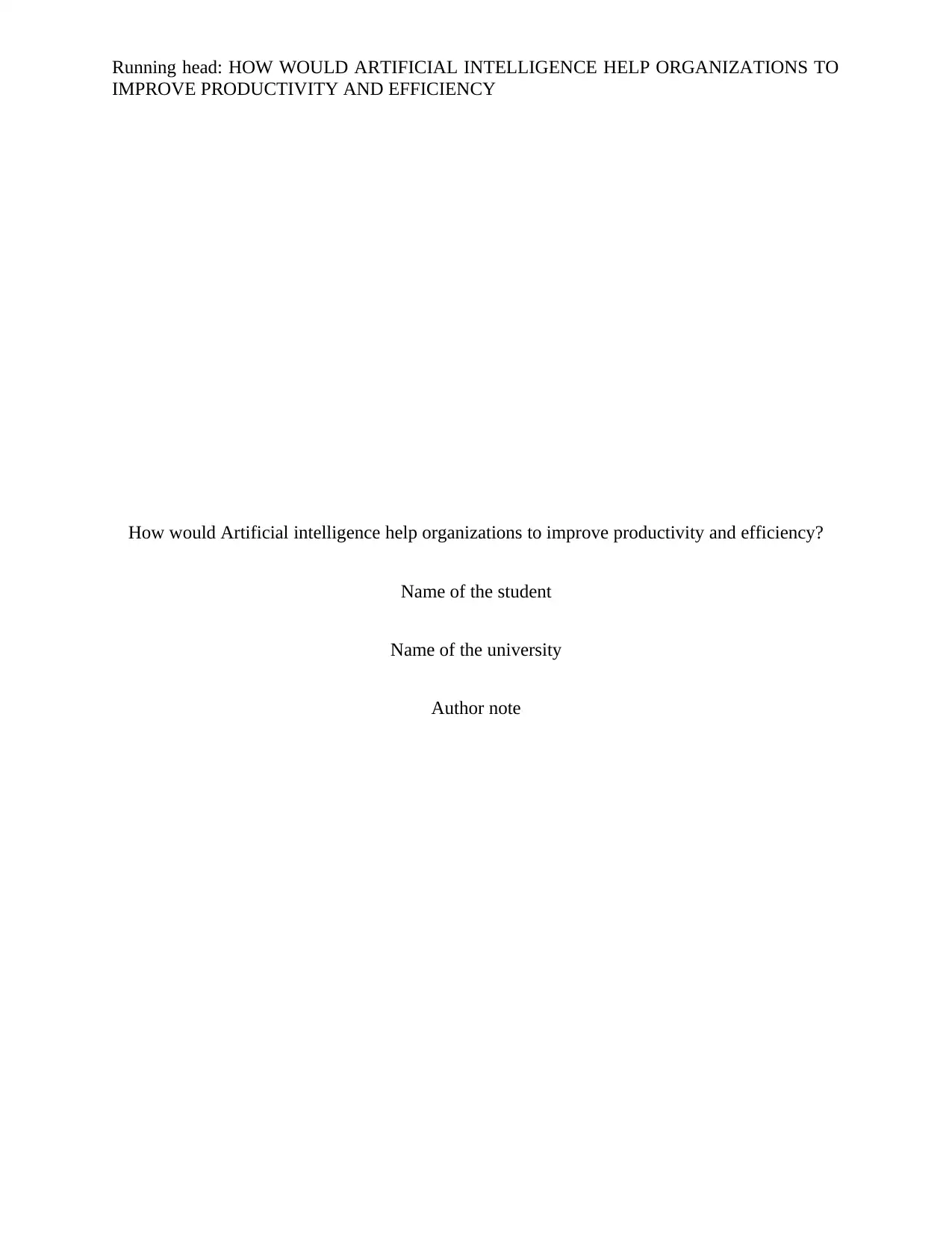
Running head: HOW WOULD ARTIFICIAL INTELLIGENCE HELP ORGANIZATIONS TO
IMPROVE PRODUCTIVITY AND EFFICIENCY
How would Artificial intelligence help organizations to improve productivity and efficiency?
Name of the student
Name of the university
Author note
IMPROVE PRODUCTIVITY AND EFFICIENCY
How would Artificial intelligence help organizations to improve productivity and efficiency?
Name of the student
Name of the university
Author note
Paraphrase This Document
Need a fresh take? Get an instant paraphrase of this document with our AI Paraphraser
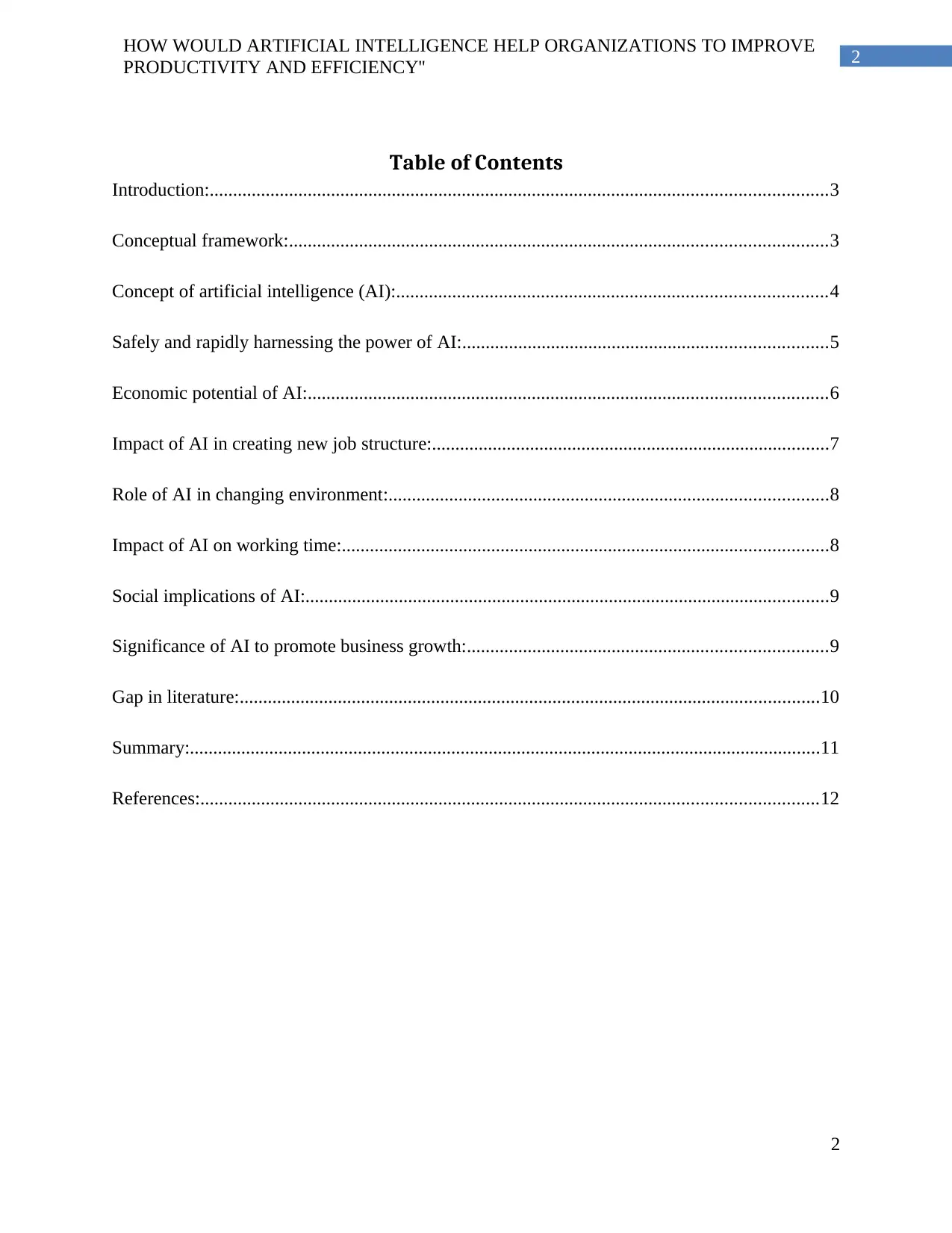
2
HOW WOULD ARTIFICIAL INTELLIGENCE HELP ORGANIZATIONS TO IMPROVE
PRODUCTIVITY AND EFFICIENCY''
Table of Contents
Introduction:....................................................................................................................................3
Conceptual framework:...................................................................................................................3
Concept of artificial intelligence (AI):............................................................................................4
Safely and rapidly harnessing the power of AI:..............................................................................5
Economic potential of AI:...............................................................................................................6
Impact of AI in creating new job structure:.....................................................................................7
Role of AI in changing environment:..............................................................................................8
Impact of AI on working time:........................................................................................................8
Social implications of AI:................................................................................................................9
Significance of AI to promote business growth:.............................................................................9
Gap in literature:............................................................................................................................10
Summary:.......................................................................................................................................11
References:....................................................................................................................................12
2
HOW WOULD ARTIFICIAL INTELLIGENCE HELP ORGANIZATIONS TO IMPROVE
PRODUCTIVITY AND EFFICIENCY''
Table of Contents
Introduction:....................................................................................................................................3
Conceptual framework:...................................................................................................................3
Concept of artificial intelligence (AI):............................................................................................4
Safely and rapidly harnessing the power of AI:..............................................................................5
Economic potential of AI:...............................................................................................................6
Impact of AI in creating new job structure:.....................................................................................7
Role of AI in changing environment:..............................................................................................8
Impact of AI on working time:........................................................................................................8
Social implications of AI:................................................................................................................9
Significance of AI to promote business growth:.............................................................................9
Gap in literature:............................................................................................................................10
Summary:.......................................................................................................................................11
References:....................................................................................................................................12
2
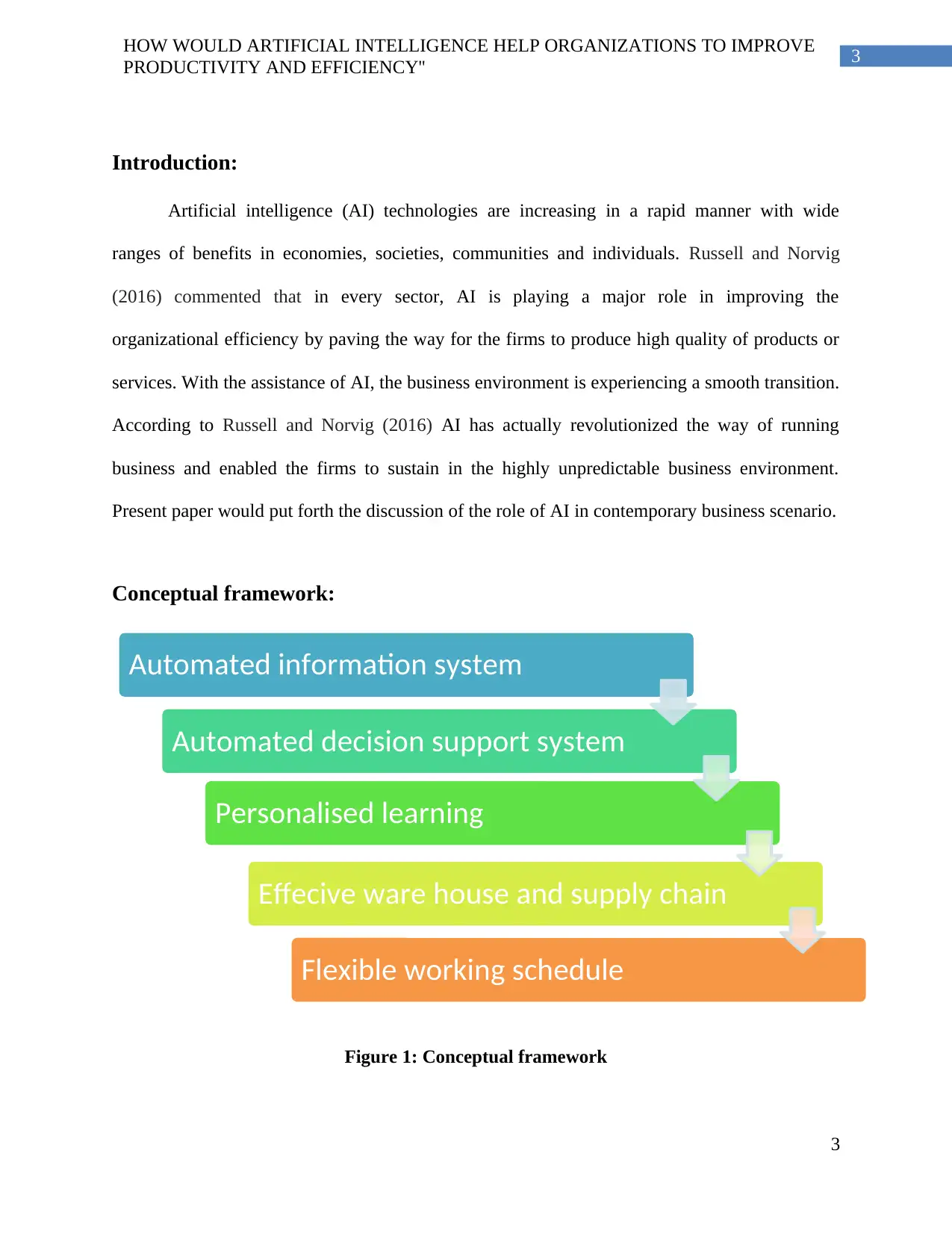
3
HOW WOULD ARTIFICIAL INTELLIGENCE HELP ORGANIZATIONS TO IMPROVE
PRODUCTIVITY AND EFFICIENCY''
Introduction:
Artificial intelligence (AI) technologies are increasing in a rapid manner with wide
ranges of benefits in economies, societies, communities and individuals. Russell and Norvig
(2016) commented that in every sector, AI is playing a major role in improving the
organizational efficiency by paving the way for the firms to produce high quality of products or
services. With the assistance of AI, the business environment is experiencing a smooth transition.
According to Russell and Norvig (2016) AI has actually revolutionized the way of running
business and enabled the firms to sustain in the highly unpredictable business environment.
Present paper would put forth the discussion of the role of AI in contemporary business scenario.
Conceptual framework:
Figure 1: Conceptual framework
3
Automated information system
Automated decision support system
Personalised learning
Effecive ware house and supply chain
Flexible working schedule
HOW WOULD ARTIFICIAL INTELLIGENCE HELP ORGANIZATIONS TO IMPROVE
PRODUCTIVITY AND EFFICIENCY''
Introduction:
Artificial intelligence (AI) technologies are increasing in a rapid manner with wide
ranges of benefits in economies, societies, communities and individuals. Russell and Norvig
(2016) commented that in every sector, AI is playing a major role in improving the
organizational efficiency by paving the way for the firms to produce high quality of products or
services. With the assistance of AI, the business environment is experiencing a smooth transition.
According to Russell and Norvig (2016) AI has actually revolutionized the way of running
business and enabled the firms to sustain in the highly unpredictable business environment.
Present paper would put forth the discussion of the role of AI in contemporary business scenario.
Conceptual framework:
Figure 1: Conceptual framework
3
Automated information system
Automated decision support system
Personalised learning
Effecive ware house and supply chain
Flexible working schedule
⊘ This is a preview!⊘
Do you want full access?
Subscribe today to unlock all pages.

Trusted by 1+ million students worldwide
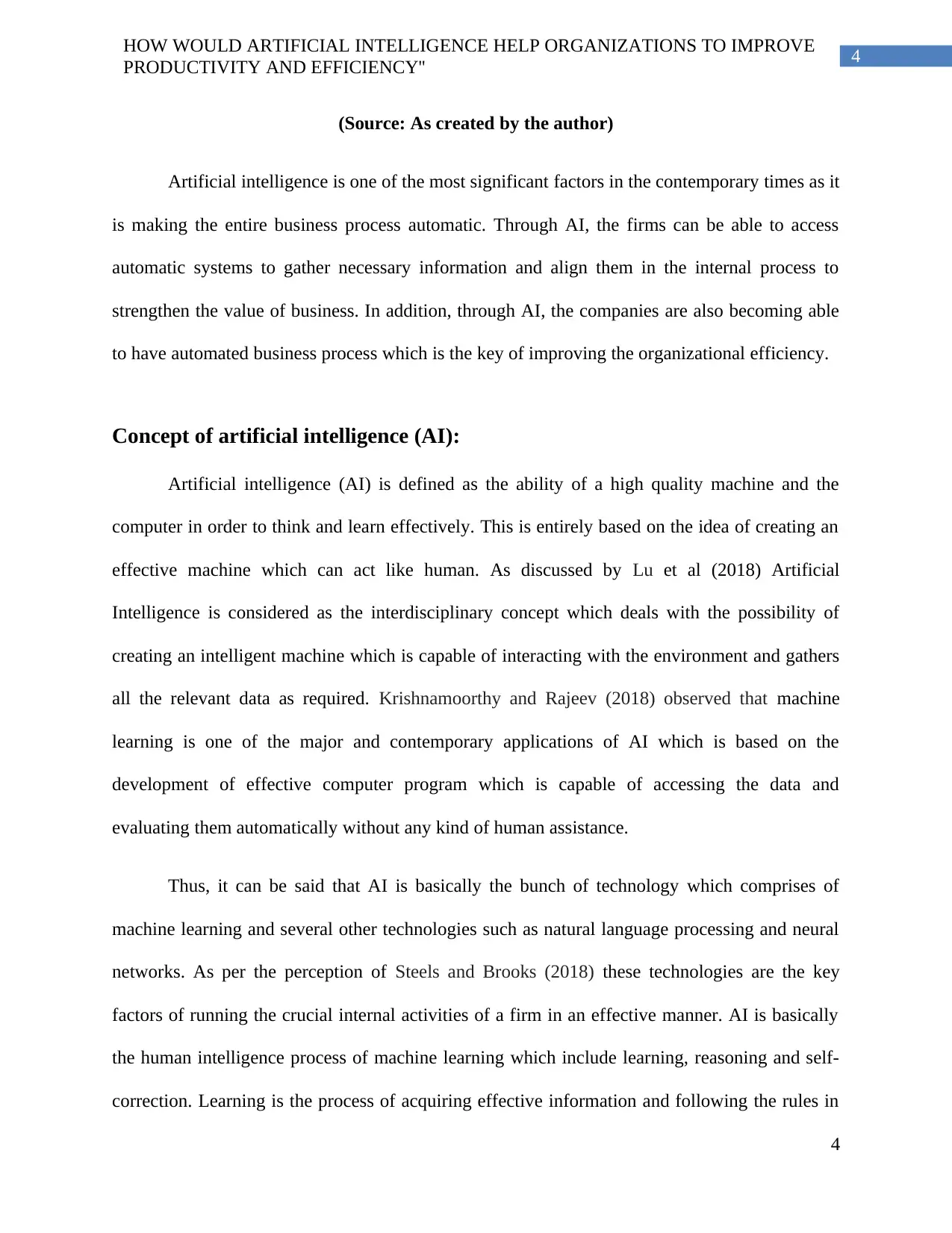
4
HOW WOULD ARTIFICIAL INTELLIGENCE HELP ORGANIZATIONS TO IMPROVE
PRODUCTIVITY AND EFFICIENCY''
(Source: As created by the author)
Artificial intelligence is one of the most significant factors in the contemporary times as it
is making the entire business process automatic. Through AI, the firms can be able to access
automatic systems to gather necessary information and align them in the internal process to
strengthen the value of business. In addition, through AI, the companies are also becoming able
to have automated business process which is the key of improving the organizational efficiency.
Concept of artificial intelligence (AI):
Artificial intelligence (AI) is defined as the ability of a high quality machine and the
computer in order to think and learn effectively. This is entirely based on the idea of creating an
effective machine which can act like human. As discussed by Lu et al (2018) Artificial
Intelligence is considered as the interdisciplinary concept which deals with the possibility of
creating an intelligent machine which is capable of interacting with the environment and gathers
all the relevant data as required. Krishnamoorthy and Rajeev (2018) observed that machine
learning is one of the major and contemporary applications of AI which is based on the
development of effective computer program which is capable of accessing the data and
evaluating them automatically without any kind of human assistance.
Thus, it can be said that AI is basically the bunch of technology which comprises of
machine learning and several other technologies such as natural language processing and neural
networks. As per the perception of Steels and Brooks (2018) these technologies are the key
factors of running the crucial internal activities of a firm in an effective manner. AI is basically
the human intelligence process of machine learning which include learning, reasoning and self-
correction. Learning is the process of acquiring effective information and following the rules in
4
HOW WOULD ARTIFICIAL INTELLIGENCE HELP ORGANIZATIONS TO IMPROVE
PRODUCTIVITY AND EFFICIENCY''
(Source: As created by the author)
Artificial intelligence is one of the most significant factors in the contemporary times as it
is making the entire business process automatic. Through AI, the firms can be able to access
automatic systems to gather necessary information and align them in the internal process to
strengthen the value of business. In addition, through AI, the companies are also becoming able
to have automated business process which is the key of improving the organizational efficiency.
Concept of artificial intelligence (AI):
Artificial intelligence (AI) is defined as the ability of a high quality machine and the
computer in order to think and learn effectively. This is entirely based on the idea of creating an
effective machine which can act like human. As discussed by Lu et al (2018) Artificial
Intelligence is considered as the interdisciplinary concept which deals with the possibility of
creating an intelligent machine which is capable of interacting with the environment and gathers
all the relevant data as required. Krishnamoorthy and Rajeev (2018) observed that machine
learning is one of the major and contemporary applications of AI which is based on the
development of effective computer program which is capable of accessing the data and
evaluating them automatically without any kind of human assistance.
Thus, it can be said that AI is basically the bunch of technology which comprises of
machine learning and several other technologies such as natural language processing and neural
networks. As per the perception of Steels and Brooks (2018) these technologies are the key
factors of running the crucial internal activities of a firm in an effective manner. AI is basically
the human intelligence process of machine learning which include learning, reasoning and self-
correction. Learning is the process of acquiring effective information and following the rules in
4
Paraphrase This Document
Need a fresh take? Get an instant paraphrase of this document with our AI Paraphraser
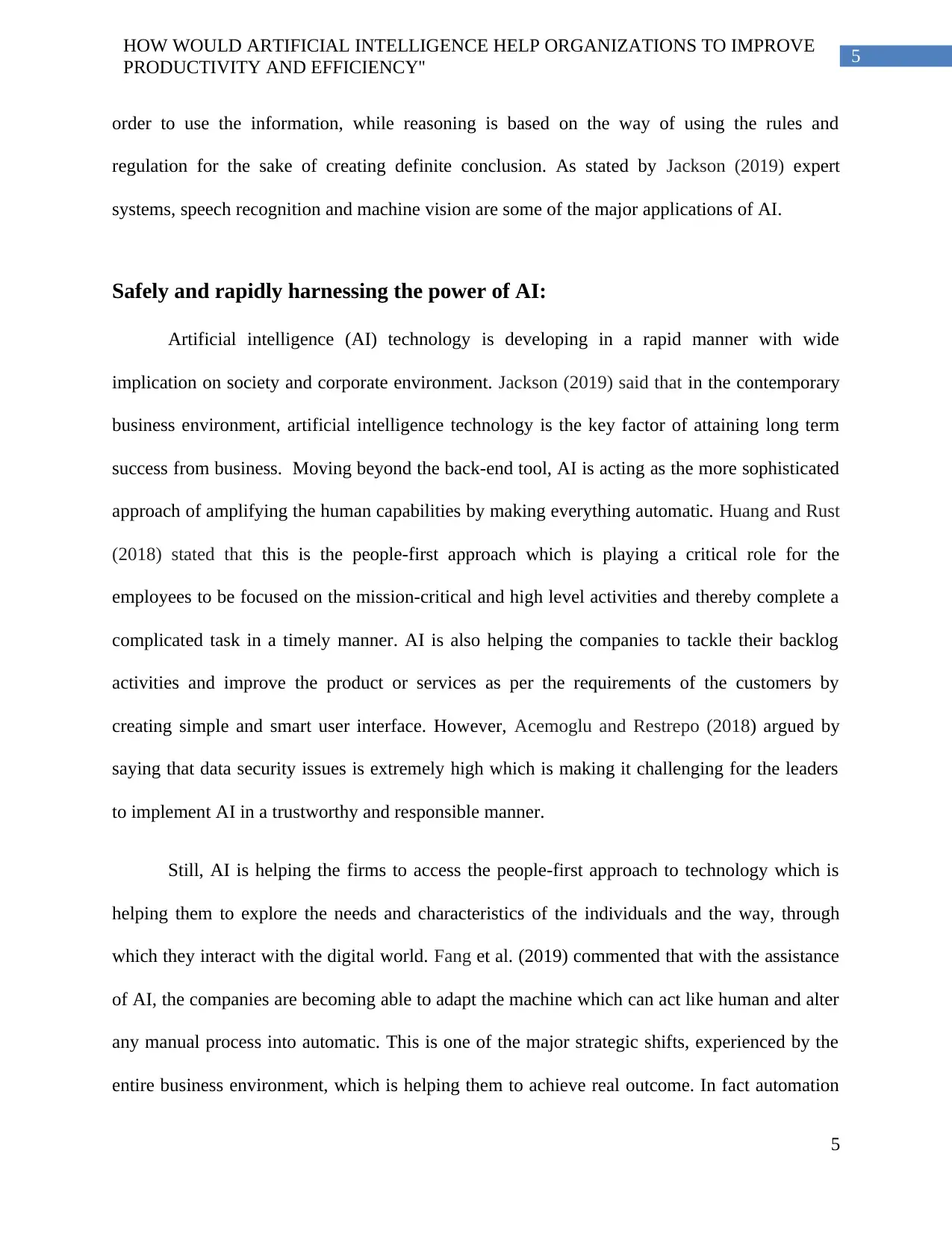
5
HOW WOULD ARTIFICIAL INTELLIGENCE HELP ORGANIZATIONS TO IMPROVE
PRODUCTIVITY AND EFFICIENCY''
order to use the information, while reasoning is based on the way of using the rules and
regulation for the sake of creating definite conclusion. As stated by Jackson (2019) expert
systems, speech recognition and machine vision are some of the major applications of AI.
Safely and rapidly harnessing the power of AI:
Artificial intelligence (AI) technology is developing in a rapid manner with wide
implication on society and corporate environment. Jackson (2019) said that in the contemporary
business environment, artificial intelligence technology is the key factor of attaining long term
success from business. Moving beyond the back-end tool, AI is acting as the more sophisticated
approach of amplifying the human capabilities by making everything automatic. Huang and Rust
(2018) stated that this is the people-first approach which is playing a critical role for the
employees to be focused on the mission-critical and high level activities and thereby complete a
complicated task in a timely manner. AI is also helping the companies to tackle their backlog
activities and improve the product or services as per the requirements of the customers by
creating simple and smart user interface. However, Acemoglu and Restrepo (2018) argued by
saying that data security issues is extremely high which is making it challenging for the leaders
to implement AI in a trustworthy and responsible manner.
Still, AI is helping the firms to access the people-first approach to technology which is
helping them to explore the needs and characteristics of the individuals and the way, through
which they interact with the digital world. Fang et al. (2019) commented that with the assistance
of AI, the companies are becoming able to adapt the machine which can act like human and alter
any manual process into automatic. This is one of the major strategic shifts, experienced by the
entire business environment, which is helping them to achieve real outcome. In fact automation
5
HOW WOULD ARTIFICIAL INTELLIGENCE HELP ORGANIZATIONS TO IMPROVE
PRODUCTIVITY AND EFFICIENCY''
order to use the information, while reasoning is based on the way of using the rules and
regulation for the sake of creating definite conclusion. As stated by Jackson (2019) expert
systems, speech recognition and machine vision are some of the major applications of AI.
Safely and rapidly harnessing the power of AI:
Artificial intelligence (AI) technology is developing in a rapid manner with wide
implication on society and corporate environment. Jackson (2019) said that in the contemporary
business environment, artificial intelligence technology is the key factor of attaining long term
success from business. Moving beyond the back-end tool, AI is acting as the more sophisticated
approach of amplifying the human capabilities by making everything automatic. Huang and Rust
(2018) stated that this is the people-first approach which is playing a critical role for the
employees to be focused on the mission-critical and high level activities and thereby complete a
complicated task in a timely manner. AI is also helping the companies to tackle their backlog
activities and improve the product or services as per the requirements of the customers by
creating simple and smart user interface. However, Acemoglu and Restrepo (2018) argued by
saying that data security issues is extremely high which is making it challenging for the leaders
to implement AI in a trustworthy and responsible manner.
Still, AI is helping the firms to access the people-first approach to technology which is
helping them to explore the needs and characteristics of the individuals and the way, through
which they interact with the digital world. Fang et al. (2019) commented that with the assistance
of AI, the companies are becoming able to adapt the machine which can act like human and alter
any manual process into automatic. This is one of the major strategic shifts, experienced by the
entire business environment, which is helping them to achieve real outcome. In fact automation
5
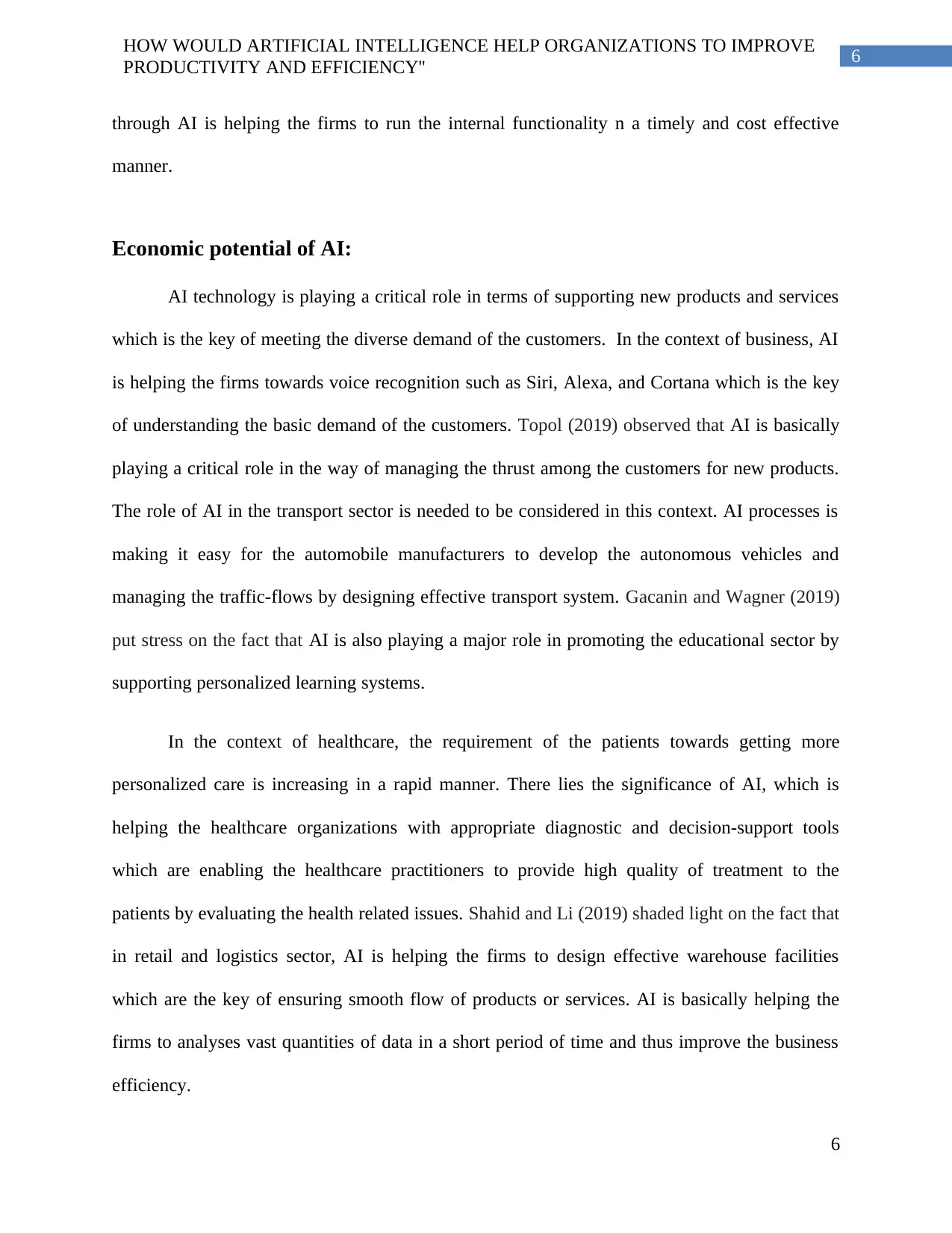
6
HOW WOULD ARTIFICIAL INTELLIGENCE HELP ORGANIZATIONS TO IMPROVE
PRODUCTIVITY AND EFFICIENCY''
through AI is helping the firms to run the internal functionality n a timely and cost effective
manner.
Economic potential of AI:
AI technology is playing a critical role in terms of supporting new products and services
which is the key of meeting the diverse demand of the customers. In the context of business, AI
is helping the firms towards voice recognition such as Siri, Alexa, and Cortana which is the key
of understanding the basic demand of the customers. Topol (2019) observed that AI is basically
playing a critical role in the way of managing the thrust among the customers for new products.
The role of AI in the transport sector is needed to be considered in this context. AI processes is
making it easy for the automobile manufacturers to develop the autonomous vehicles and
managing the traffic-flows by designing effective transport system. Gacanin and Wagner (2019)
put stress on the fact that AI is also playing a major role in promoting the educational sector by
supporting personalized learning systems.
In the context of healthcare, the requirement of the patients towards getting more
personalized care is increasing in a rapid manner. There lies the significance of AI, which is
helping the healthcare organizations with appropriate diagnostic and decision-support tools
which are enabling the healthcare practitioners to provide high quality of treatment to the
patients by evaluating the health related issues. Shahid and Li (2019) shaded light on the fact that
in retail and logistics sector, AI is helping the firms to design effective warehouse facilities
which are the key of ensuring smooth flow of products or services. AI is basically helping the
firms to analyses vast quantities of data in a short period of time and thus improve the business
efficiency.
6
HOW WOULD ARTIFICIAL INTELLIGENCE HELP ORGANIZATIONS TO IMPROVE
PRODUCTIVITY AND EFFICIENCY''
through AI is helping the firms to run the internal functionality n a timely and cost effective
manner.
Economic potential of AI:
AI technology is playing a critical role in terms of supporting new products and services
which is the key of meeting the diverse demand of the customers. In the context of business, AI
is helping the firms towards voice recognition such as Siri, Alexa, and Cortana which is the key
of understanding the basic demand of the customers. Topol (2019) observed that AI is basically
playing a critical role in the way of managing the thrust among the customers for new products.
The role of AI in the transport sector is needed to be considered in this context. AI processes is
making it easy for the automobile manufacturers to develop the autonomous vehicles and
managing the traffic-flows by designing effective transport system. Gacanin and Wagner (2019)
put stress on the fact that AI is also playing a major role in promoting the educational sector by
supporting personalized learning systems.
In the context of healthcare, the requirement of the patients towards getting more
personalized care is increasing in a rapid manner. There lies the significance of AI, which is
helping the healthcare organizations with appropriate diagnostic and decision-support tools
which are enabling the healthcare practitioners to provide high quality of treatment to the
patients by evaluating the health related issues. Shahid and Li (2019) shaded light on the fact that
in retail and logistics sector, AI is helping the firms to design effective warehouse facilities
which are the key of ensuring smooth flow of products or services. AI is basically helping the
firms to analyses vast quantities of data in a short period of time and thus improve the business
efficiency.
6
⊘ This is a preview!⊘
Do you want full access?
Subscribe today to unlock all pages.

Trusted by 1+ million students worldwide
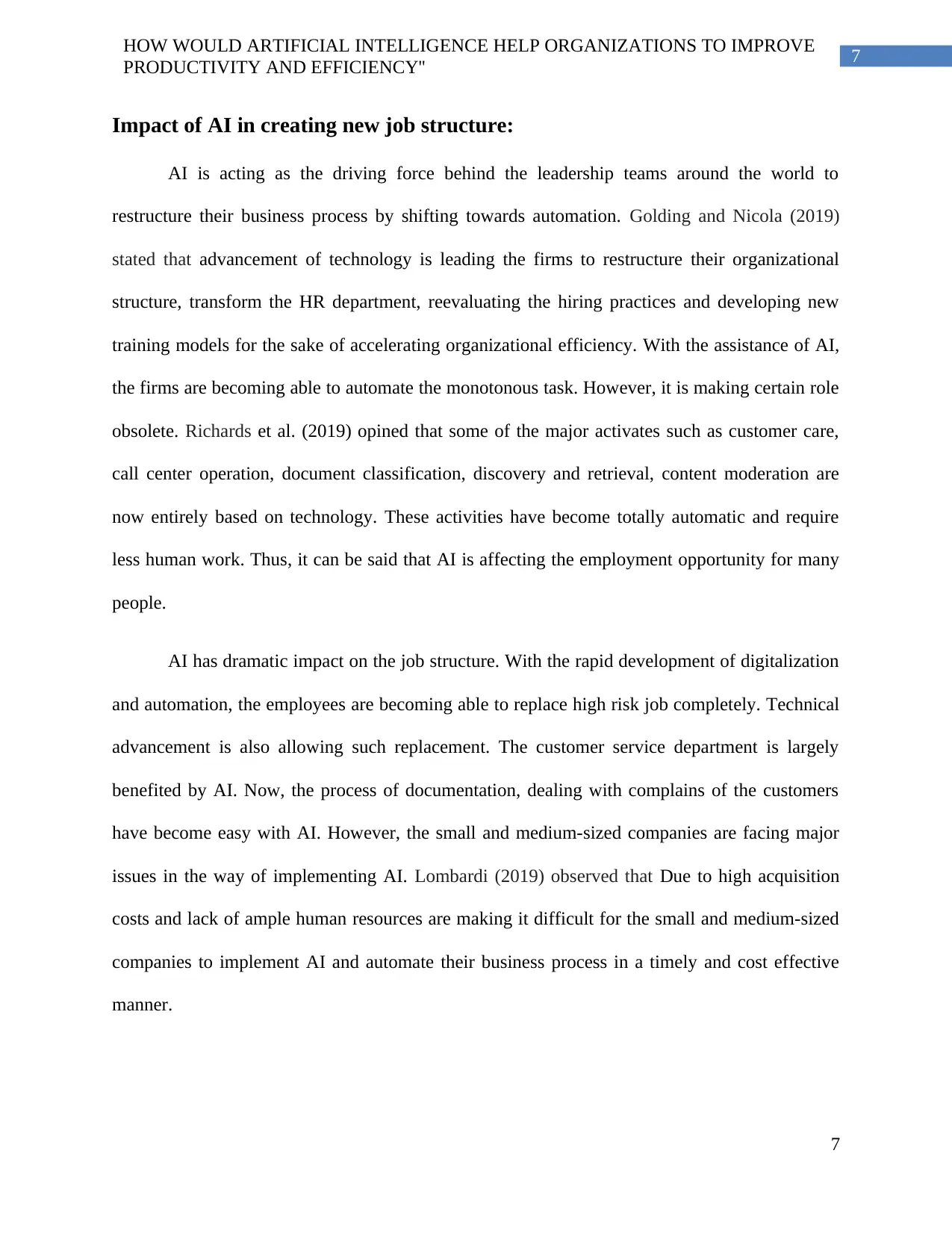
7
HOW WOULD ARTIFICIAL INTELLIGENCE HELP ORGANIZATIONS TO IMPROVE
PRODUCTIVITY AND EFFICIENCY''
Impact of AI in creating new job structure:
AI is acting as the driving force behind the leadership teams around the world to
restructure their business process by shifting towards automation. Golding and Nicola (2019)
stated that advancement of technology is leading the firms to restructure their organizational
structure, transform the HR department, reevaluating the hiring practices and developing new
training models for the sake of accelerating organizational efficiency. With the assistance of AI,
the firms are becoming able to automate the monotonous task. However, it is making certain role
obsolete. Richards et al. (2019) opined that some of the major activates such as customer care,
call center operation, document classification, discovery and retrieval, content moderation are
now entirely based on technology. These activities have become totally automatic and require
less human work. Thus, it can be said that AI is affecting the employment opportunity for many
people.
AI has dramatic impact on the job structure. With the rapid development of digitalization
and automation, the employees are becoming able to replace high risk job completely. Technical
advancement is also allowing such replacement. The customer service department is largely
benefited by AI. Now, the process of documentation, dealing with complains of the customers
have become easy with AI. However, the small and medium-sized companies are facing major
issues in the way of implementing AI. Lombardi (2019) observed that Due to high acquisition
costs and lack of ample human resources are making it difficult for the small and medium-sized
companies to implement AI and automate their business process in a timely and cost effective
manner.
7
HOW WOULD ARTIFICIAL INTELLIGENCE HELP ORGANIZATIONS TO IMPROVE
PRODUCTIVITY AND EFFICIENCY''
Impact of AI in creating new job structure:
AI is acting as the driving force behind the leadership teams around the world to
restructure their business process by shifting towards automation. Golding and Nicola (2019)
stated that advancement of technology is leading the firms to restructure their organizational
structure, transform the HR department, reevaluating the hiring practices and developing new
training models for the sake of accelerating organizational efficiency. With the assistance of AI,
the firms are becoming able to automate the monotonous task. However, it is making certain role
obsolete. Richards et al. (2019) opined that some of the major activates such as customer care,
call center operation, document classification, discovery and retrieval, content moderation are
now entirely based on technology. These activities have become totally automatic and require
less human work. Thus, it can be said that AI is affecting the employment opportunity for many
people.
AI has dramatic impact on the job structure. With the rapid development of digitalization
and automation, the employees are becoming able to replace high risk job completely. Technical
advancement is also allowing such replacement. The customer service department is largely
benefited by AI. Now, the process of documentation, dealing with complains of the customers
have become easy with AI. However, the small and medium-sized companies are facing major
issues in the way of implementing AI. Lombardi (2019) observed that Due to high acquisition
costs and lack of ample human resources are making it difficult for the small and medium-sized
companies to implement AI and automate their business process in a timely and cost effective
manner.
7
Paraphrase This Document
Need a fresh take? Get an instant paraphrase of this document with our AI Paraphraser
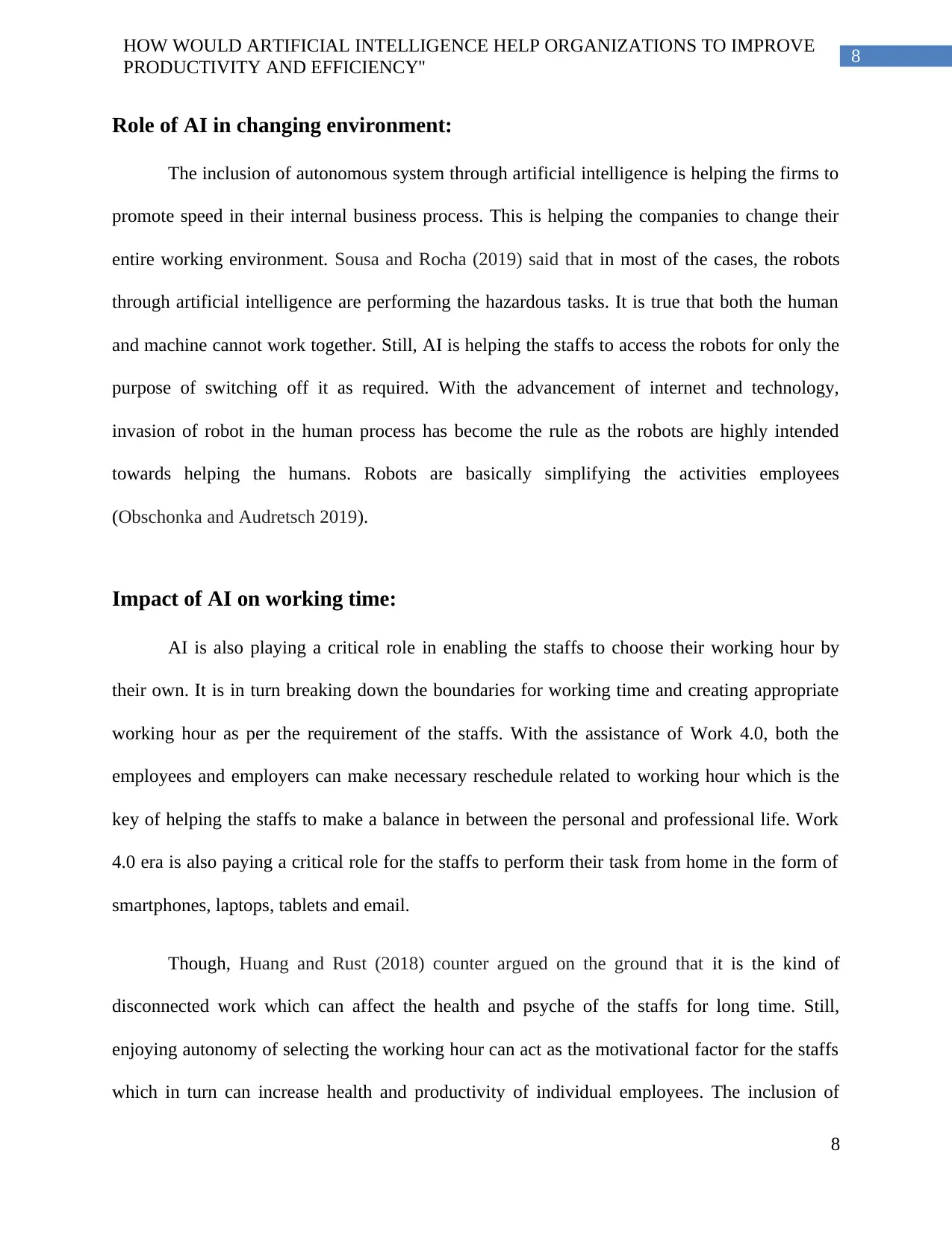
8
HOW WOULD ARTIFICIAL INTELLIGENCE HELP ORGANIZATIONS TO IMPROVE
PRODUCTIVITY AND EFFICIENCY''
Role of AI in changing environment:
The inclusion of autonomous system through artificial intelligence is helping the firms to
promote speed in their internal business process. This is helping the companies to change their
entire working environment. Sousa and Rocha (2019) said that in most of the cases, the robots
through artificial intelligence are performing the hazardous tasks. It is true that both the human
and machine cannot work together. Still, AI is helping the staffs to access the robots for only the
purpose of switching off it as required. With the advancement of internet and technology,
invasion of robot in the human process has become the rule as the robots are highly intended
towards helping the humans. Robots are basically simplifying the activities employees
(Obschonka and Audretsch 2019).
Impact of AI on working time:
AI is also playing a critical role in enabling the staffs to choose their working hour by
their own. It is in turn breaking down the boundaries for working time and creating appropriate
working hour as per the requirement of the staffs. With the assistance of Work 4.0, both the
employees and employers can make necessary reschedule related to working hour which is the
key of helping the staffs to make a balance in between the personal and professional life. Work
4.0 era is also paying a critical role for the staffs to perform their task from home in the form of
smartphones, laptops, tablets and email.
Though, Huang and Rust (2018) counter argued on the ground that it is the kind of
disconnected work which can affect the health and psyche of the staffs for long time. Still,
enjoying autonomy of selecting the working hour can act as the motivational factor for the staffs
which in turn can increase health and productivity of individual employees. The inclusion of
8
HOW WOULD ARTIFICIAL INTELLIGENCE HELP ORGANIZATIONS TO IMPROVE
PRODUCTIVITY AND EFFICIENCY''
Role of AI in changing environment:
The inclusion of autonomous system through artificial intelligence is helping the firms to
promote speed in their internal business process. This is helping the companies to change their
entire working environment. Sousa and Rocha (2019) said that in most of the cases, the robots
through artificial intelligence are performing the hazardous tasks. It is true that both the human
and machine cannot work together. Still, AI is helping the staffs to access the robots for only the
purpose of switching off it as required. With the advancement of internet and technology,
invasion of robot in the human process has become the rule as the robots are highly intended
towards helping the humans. Robots are basically simplifying the activities employees
(Obschonka and Audretsch 2019).
Impact of AI on working time:
AI is also playing a critical role in enabling the staffs to choose their working hour by
their own. It is in turn breaking down the boundaries for working time and creating appropriate
working hour as per the requirement of the staffs. With the assistance of Work 4.0, both the
employees and employers can make necessary reschedule related to working hour which is the
key of helping the staffs to make a balance in between the personal and professional life. Work
4.0 era is also paying a critical role for the staffs to perform their task from home in the form of
smartphones, laptops, tablets and email.
Though, Huang and Rust (2018) counter argued on the ground that it is the kind of
disconnected work which can affect the health and psyche of the staffs for long time. Still,
enjoying autonomy of selecting the working hour can act as the motivational factor for the staffs
which in turn can increase health and productivity of individual employees. The inclusion of
8
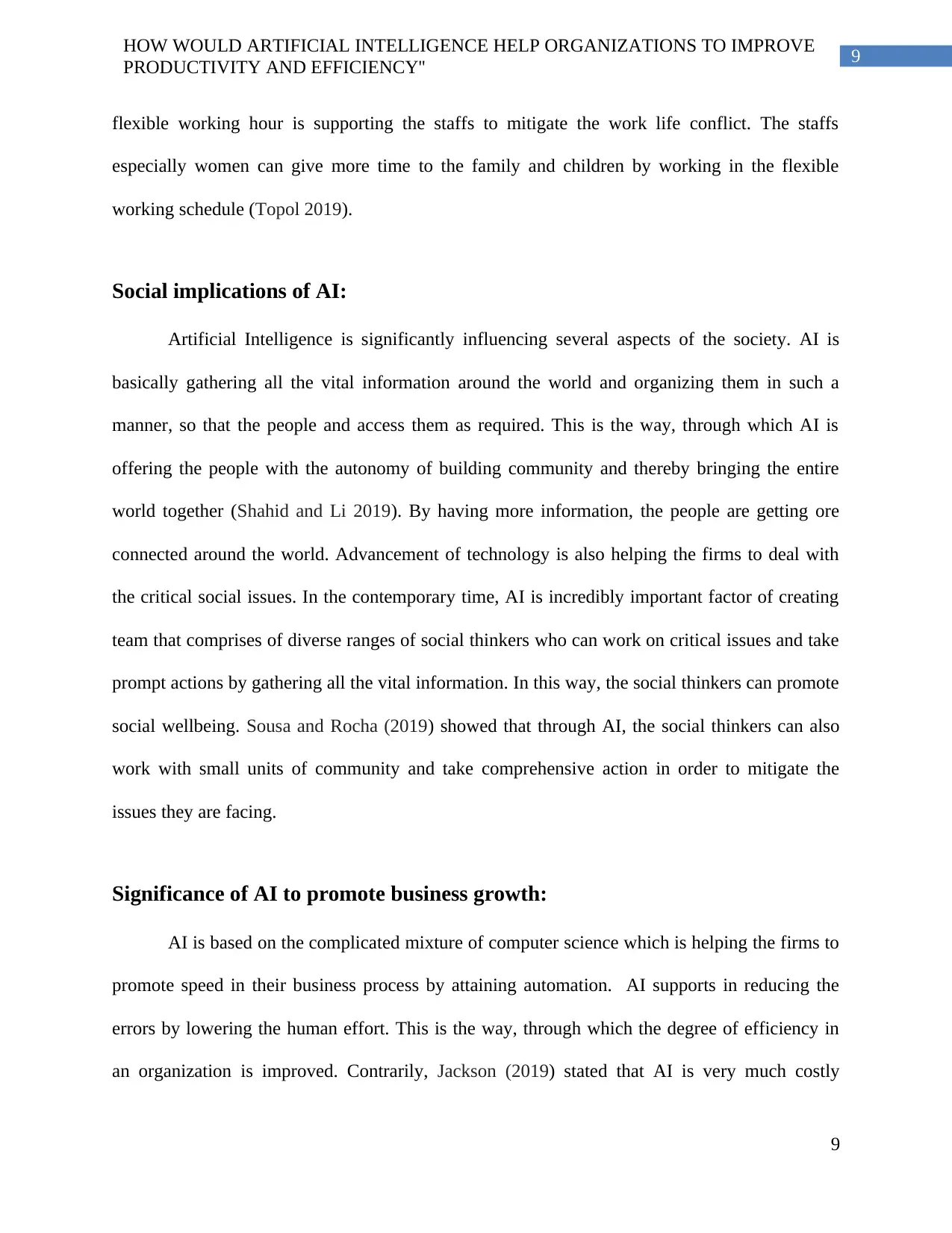
9
HOW WOULD ARTIFICIAL INTELLIGENCE HELP ORGANIZATIONS TO IMPROVE
PRODUCTIVITY AND EFFICIENCY''
flexible working hour is supporting the staffs to mitigate the work life conflict. The staffs
especially women can give more time to the family and children by working in the flexible
working schedule (Topol 2019).
Social implications of AI:
Artificial Intelligence is significantly influencing several aspects of the society. AI is
basically gathering all the vital information around the world and organizing them in such a
manner, so that the people and access them as required. This is the way, through which AI is
offering the people with the autonomy of building community and thereby bringing the entire
world together (Shahid and Li 2019). By having more information, the people are getting ore
connected around the world. Advancement of technology is also helping the firms to deal with
the critical social issues. In the contemporary time, AI is incredibly important factor of creating
team that comprises of diverse ranges of social thinkers who can work on critical issues and take
prompt actions by gathering all the vital information. In this way, the social thinkers can promote
social wellbeing. Sousa and Rocha (2019) showed that through AI, the social thinkers can also
work with small units of community and take comprehensive action in order to mitigate the
issues they are facing.
Significance of AI to promote business growth:
AI is based on the complicated mixture of computer science which is helping the firms to
promote speed in their business process by attaining automation. AI supports in reducing the
errors by lowering the human effort. This is the way, through which the degree of efficiency in
an organization is improved. Contrarily, Jackson (2019) stated that AI is very much costly
9
HOW WOULD ARTIFICIAL INTELLIGENCE HELP ORGANIZATIONS TO IMPROVE
PRODUCTIVITY AND EFFICIENCY''
flexible working hour is supporting the staffs to mitigate the work life conflict. The staffs
especially women can give more time to the family and children by working in the flexible
working schedule (Topol 2019).
Social implications of AI:
Artificial Intelligence is significantly influencing several aspects of the society. AI is
basically gathering all the vital information around the world and organizing them in such a
manner, so that the people and access them as required. This is the way, through which AI is
offering the people with the autonomy of building community and thereby bringing the entire
world together (Shahid and Li 2019). By having more information, the people are getting ore
connected around the world. Advancement of technology is also helping the firms to deal with
the critical social issues. In the contemporary time, AI is incredibly important factor of creating
team that comprises of diverse ranges of social thinkers who can work on critical issues and take
prompt actions by gathering all the vital information. In this way, the social thinkers can promote
social wellbeing. Sousa and Rocha (2019) showed that through AI, the social thinkers can also
work with small units of community and take comprehensive action in order to mitigate the
issues they are facing.
Significance of AI to promote business growth:
AI is based on the complicated mixture of computer science which is helping the firms to
promote speed in their business process by attaining automation. AI supports in reducing the
errors by lowering the human effort. This is the way, through which the degree of efficiency in
an organization is improved. Contrarily, Jackson (2019) stated that AI is very much costly
9
⊘ This is a preview!⊘
Do you want full access?
Subscribe today to unlock all pages.

Trusted by 1+ million students worldwide
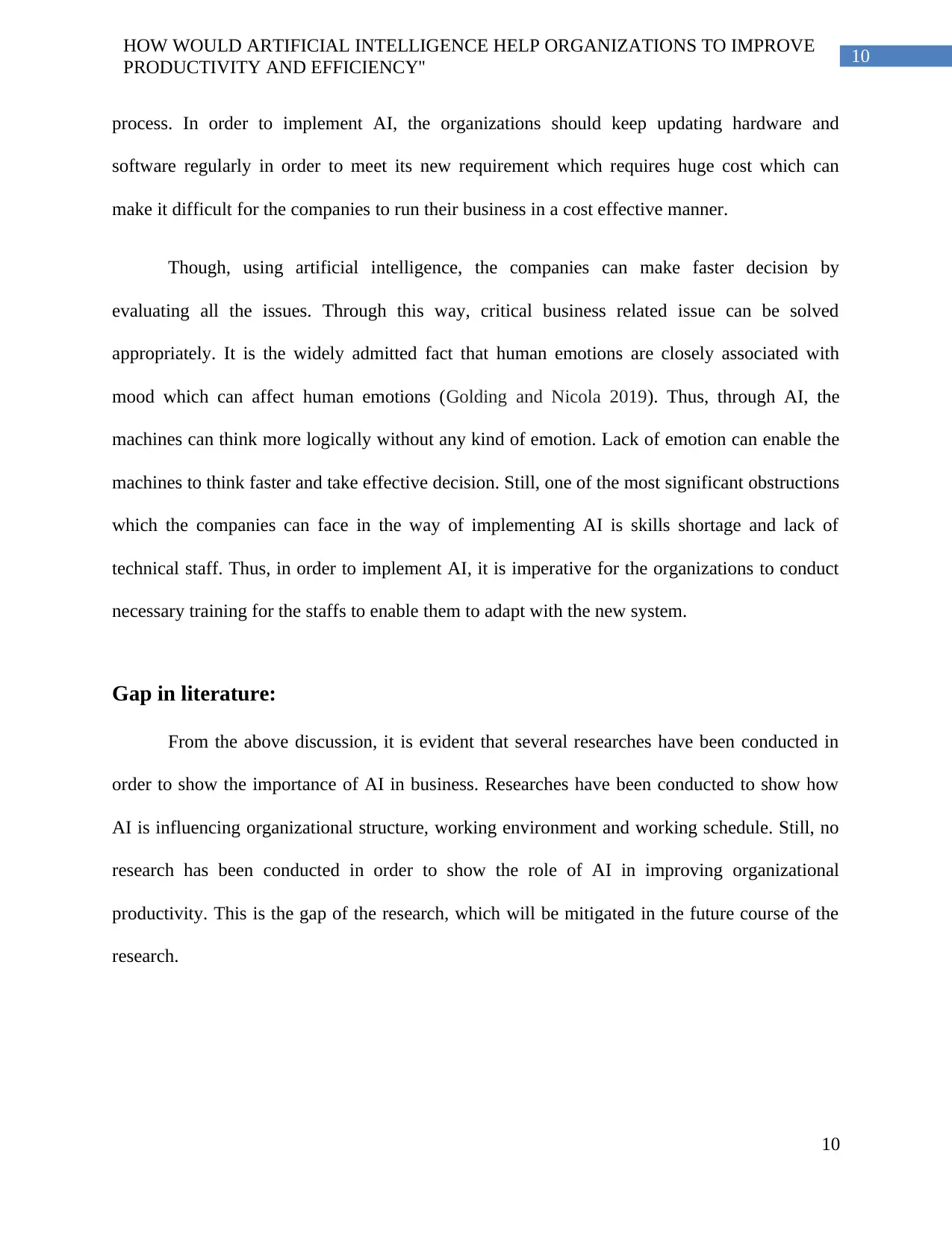
10
HOW WOULD ARTIFICIAL INTELLIGENCE HELP ORGANIZATIONS TO IMPROVE
PRODUCTIVITY AND EFFICIENCY''
process. In order to implement AI, the organizations should keep updating hardware and
software regularly in order to meet its new requirement which requires huge cost which can
make it difficult for the companies to run their business in a cost effective manner.
Though, using artificial intelligence, the companies can make faster decision by
evaluating all the issues. Through this way, critical business related issue can be solved
appropriately. It is the widely admitted fact that human emotions are closely associated with
mood which can affect human emotions (Golding and Nicola 2019). Thus, through AI, the
machines can think more logically without any kind of emotion. Lack of emotion can enable the
machines to think faster and take effective decision. Still, one of the most significant obstructions
which the companies can face in the way of implementing AI is skills shortage and lack of
technical staff. Thus, in order to implement AI, it is imperative for the organizations to conduct
necessary training for the staffs to enable them to adapt with the new system.
Gap in literature:
From the above discussion, it is evident that several researches have been conducted in
order to show the importance of AI in business. Researches have been conducted to show how
AI is influencing organizational structure, working environment and working schedule. Still, no
research has been conducted in order to show the role of AI in improving organizational
productivity. This is the gap of the research, which will be mitigated in the future course of the
research.
10
HOW WOULD ARTIFICIAL INTELLIGENCE HELP ORGANIZATIONS TO IMPROVE
PRODUCTIVITY AND EFFICIENCY''
process. In order to implement AI, the organizations should keep updating hardware and
software regularly in order to meet its new requirement which requires huge cost which can
make it difficult for the companies to run their business in a cost effective manner.
Though, using artificial intelligence, the companies can make faster decision by
evaluating all the issues. Through this way, critical business related issue can be solved
appropriately. It is the widely admitted fact that human emotions are closely associated with
mood which can affect human emotions (Golding and Nicola 2019). Thus, through AI, the
machines can think more logically without any kind of emotion. Lack of emotion can enable the
machines to think faster and take effective decision. Still, one of the most significant obstructions
which the companies can face in the way of implementing AI is skills shortage and lack of
technical staff. Thus, in order to implement AI, it is imperative for the organizations to conduct
necessary training for the staffs to enable them to adapt with the new system.
Gap in literature:
From the above discussion, it is evident that several researches have been conducted in
order to show the importance of AI in business. Researches have been conducted to show how
AI is influencing organizational structure, working environment and working schedule. Still, no
research has been conducted in order to show the role of AI in improving organizational
productivity. This is the gap of the research, which will be mitigated in the future course of the
research.
10
Paraphrase This Document
Need a fresh take? Get an instant paraphrase of this document with our AI Paraphraser
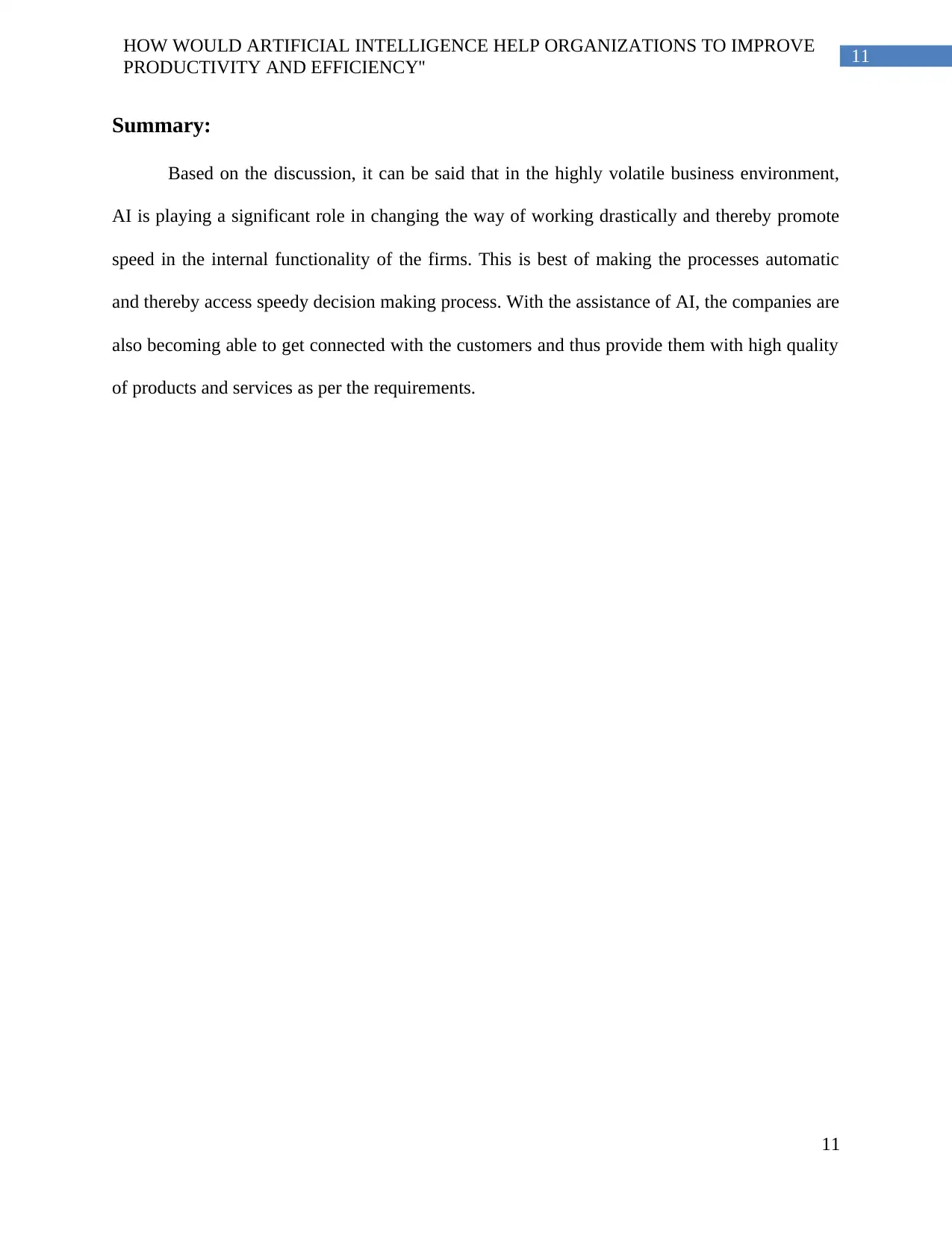
11
HOW WOULD ARTIFICIAL INTELLIGENCE HELP ORGANIZATIONS TO IMPROVE
PRODUCTIVITY AND EFFICIENCY''
Summary:
Based on the discussion, it can be said that in the highly volatile business environment,
AI is playing a significant role in changing the way of working drastically and thereby promote
speed in the internal functionality of the firms. This is best of making the processes automatic
and thereby access speedy decision making process. With the assistance of AI, the companies are
also becoming able to get connected with the customers and thus provide them with high quality
of products and services as per the requirements.
11
HOW WOULD ARTIFICIAL INTELLIGENCE HELP ORGANIZATIONS TO IMPROVE
PRODUCTIVITY AND EFFICIENCY''
Summary:
Based on the discussion, it can be said that in the highly volatile business environment,
AI is playing a significant role in changing the way of working drastically and thereby promote
speed in the internal functionality of the firms. This is best of making the processes automatic
and thereby access speedy decision making process. With the assistance of AI, the companies are
also becoming able to get connected with the customers and thus provide them with high quality
of products and services as per the requirements.
11
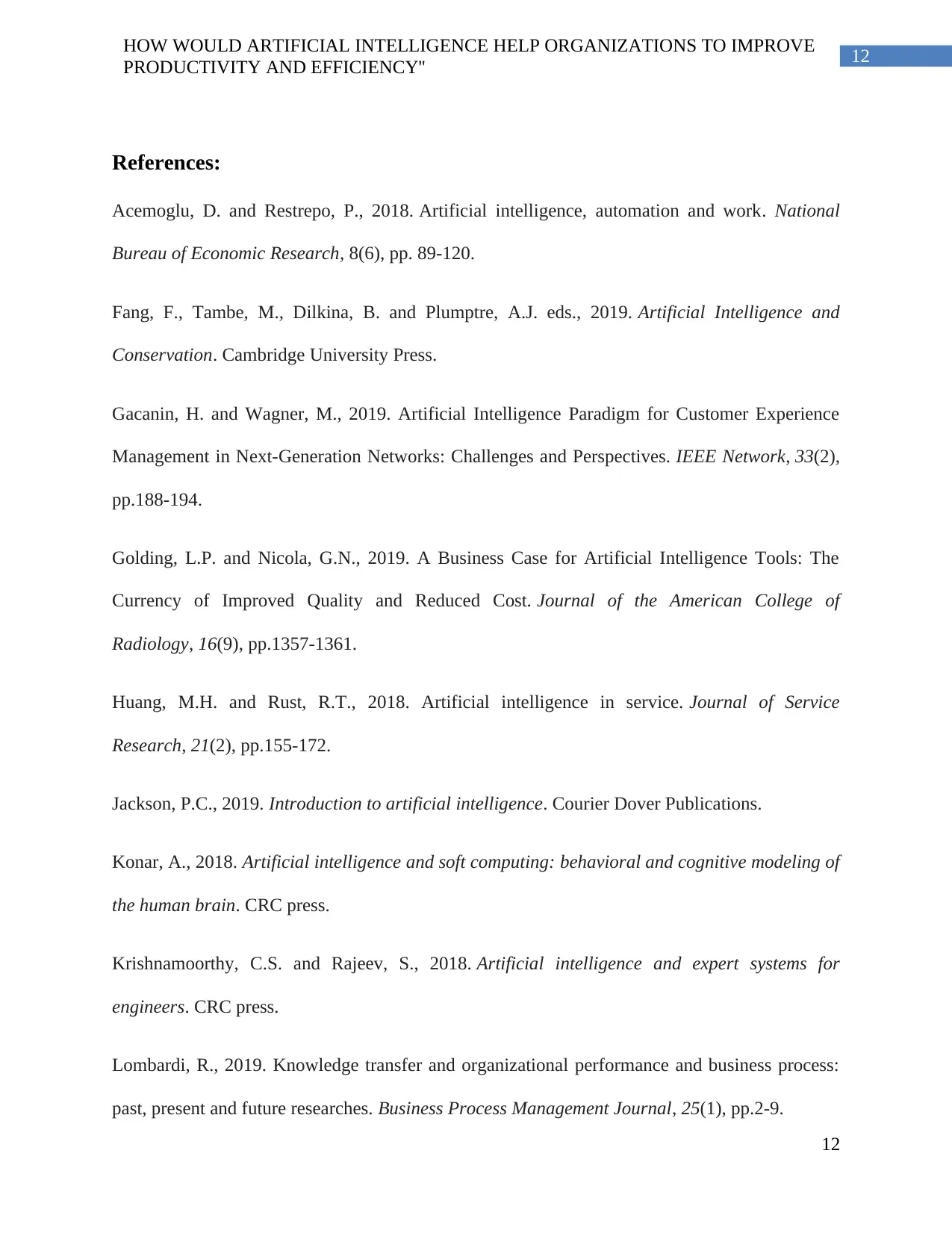
12
HOW WOULD ARTIFICIAL INTELLIGENCE HELP ORGANIZATIONS TO IMPROVE
PRODUCTIVITY AND EFFICIENCY''
References:
Acemoglu, D. and Restrepo, P., 2018. Artificial intelligence, automation and work. National
Bureau of Economic Research, 8(6), pp. 89-120.
Fang, F., Tambe, M., Dilkina, B. and Plumptre, A.J. eds., 2019. Artificial Intelligence and
Conservation. Cambridge University Press.
Gacanin, H. and Wagner, M., 2019. Artificial Intelligence Paradigm for Customer Experience
Management in Next-Generation Networks: Challenges and Perspectives. IEEE Network, 33(2),
pp.188-194.
Golding, L.P. and Nicola, G.N., 2019. A Business Case for Artificial Intelligence Tools: The
Currency of Improved Quality and Reduced Cost. Journal of the American College of
Radiology, 16(9), pp.1357-1361.
Huang, M.H. and Rust, R.T., 2018. Artificial intelligence in service. Journal of Service
Research, 21(2), pp.155-172.
Jackson, P.C., 2019. Introduction to artificial intelligence. Courier Dover Publications.
Konar, A., 2018. Artificial intelligence and soft computing: behavioral and cognitive modeling of
the human brain. CRC press.
Krishnamoorthy, C.S. and Rajeev, S., 2018. Artificial intelligence and expert systems for
engineers. CRC press.
Lombardi, R., 2019. Knowledge transfer and organizational performance and business process:
past, present and future researches. Business Process Management Journal, 25(1), pp.2-9.
12
HOW WOULD ARTIFICIAL INTELLIGENCE HELP ORGANIZATIONS TO IMPROVE
PRODUCTIVITY AND EFFICIENCY''
References:
Acemoglu, D. and Restrepo, P., 2018. Artificial intelligence, automation and work. National
Bureau of Economic Research, 8(6), pp. 89-120.
Fang, F., Tambe, M., Dilkina, B. and Plumptre, A.J. eds., 2019. Artificial Intelligence and
Conservation. Cambridge University Press.
Gacanin, H. and Wagner, M., 2019. Artificial Intelligence Paradigm for Customer Experience
Management in Next-Generation Networks: Challenges and Perspectives. IEEE Network, 33(2),
pp.188-194.
Golding, L.P. and Nicola, G.N., 2019. A Business Case for Artificial Intelligence Tools: The
Currency of Improved Quality and Reduced Cost. Journal of the American College of
Radiology, 16(9), pp.1357-1361.
Huang, M.H. and Rust, R.T., 2018. Artificial intelligence in service. Journal of Service
Research, 21(2), pp.155-172.
Jackson, P.C., 2019. Introduction to artificial intelligence. Courier Dover Publications.
Konar, A., 2018. Artificial intelligence and soft computing: behavioral and cognitive modeling of
the human brain. CRC press.
Krishnamoorthy, C.S. and Rajeev, S., 2018. Artificial intelligence and expert systems for
engineers. CRC press.
Lombardi, R., 2019. Knowledge transfer and organizational performance and business process:
past, present and future researches. Business Process Management Journal, 25(1), pp.2-9.
12
⊘ This is a preview!⊘
Do you want full access?
Subscribe today to unlock all pages.

Trusted by 1+ million students worldwide
1 out of 13
Related Documents
Your All-in-One AI-Powered Toolkit for Academic Success.
+13062052269
info@desklib.com
Available 24*7 on WhatsApp / Email
![[object Object]](/_next/static/media/star-bottom.7253800d.svg)
Unlock your academic potential
Copyright © 2020–2026 A2Z Services. All Rights Reserved. Developed and managed by ZUCOL.





